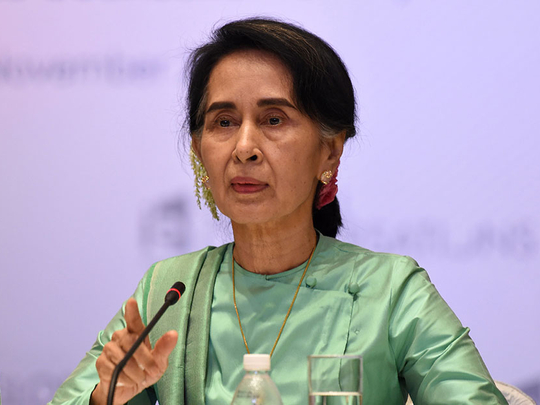
In November 2015, the party of Burmese opposition leader Aung San Suu Kyi won a landslide victory in the country’s first free election in decades. The expectations of her supporters were sky-high. Among the most prominent hopes of her constituents: that the Lady, as she is widely known, could finally end the country’s long-running civil war. Surely if anyone could bring the military to the negotiating table with the myriad armed ethnic groups, it was the revered leader of the National League for Democracy (NLD).
A year and a half later, the odds of achieving national reconciliation appear as slim as at any time in the past six decades. And that bodes ill for a country (also known as Myanmar) whose geopolitical position between China and India makes it a strategic linchpin of its region.
Until the NLD makes genuine political concessions to recalcitrant armed groups in Myanmar’s north, lasting peace will almost certainly remain unattainable. Ethnic groups want the government to grant them increased autonomy and ensure that certain areas will be off-limits to incursions by the Burmese military — concessions that are unlikely given that the generals, who retain considerable power, view federalism as a threat to national unity.
Aung San Suu Kyi, who received the Nobel Peace Prize for her role in Myanmar’s democracy struggle, inherited previous president Thein Sein’s quest for a ceasefire accord following her political ascendancies. Now in office, Aung San Suu Kyi is in a tough position, grappling with the military’s entrenched dominance over civilian government while working to earn the generals’ trust, which is essential to resolving conflict.
Aung San Suu Kyi also carries the burden of historical legacy. Her father, Gen. Aung San, led the country’s struggle for independence from the British following World War II, until he was assassinated on the eve of nationhood in 1947. Before his death, he laid out a comprehensive vision for power-sharing among the country’s ethnic groups. In his absence, war broke out between them and the central government in 1948 and has continued ever since.
Now the daughter of the revolution is seeking to accomplish her father’s dream of national reconciliation. In 2015, eight of 15 ethnic armed groups signed a nationwide ceasefire agreement with Thein Sein’s government. A new series of talks followed in September 2016. But since then negotiations have stalled. Some members of the ethnic groups accuse Aung San Suu Kyi of being blind to their political grievances and steamrollering local leaders to enforce her party’s agenda. Despite the great priority she has placed on achieving a peace deal, she has lost trust outside of central Myanmar by lecturing, rather than listening to, the views of ethnic groups.
On March 30, Aung San Suu Kyi announced that five holdout groups had agreed to sign onto the ceasefire agreement, bringing peace within grasp. Just hours later, however, a spokesperson representing one of the five ethnic parties negotiating with the government, refuted her claim. He told Radio Free Asia that several key ethnic organisations remained split on the decision to sign the government’s agreement.
Distrust lingers on all sides. Aung San Suu Kyi has called for unity and self-sacrifice from ethnic groups still fighting the central government. Yet critics from various states have lost faith in her party. Many ethnic groups perceive the military, and by extension Aung San Suu Kyi, as imperious and out of touch with their concerns. “The government doesn’t value ethnic diversity,” one activist declared. Citizens in Mon State protested her government’s decision to name a bridge there after her father, the general who more than 70 years ago fought to liberate and unify the divided country.
When the NLD entered parliament with a clear majority in early 2016, it promoted its own leaders as chief ministers in states where it had won, even if it had lacked a majority of votes. The move alienated opposition politicians and ethnic citizens who resent the NLD’s imposing stature.
The international community has condemned Aung San Suu Kyi’s failure to dampen racial and religious tensions in Rakhine State, where some 140,000 Rohingya, an ethnic Muslim minority, remain confined to squalid refugee camps and face fierce repression from security forces and the Rakhine Buddhist population.
The latest round of peace talks has been indefinitely postponed, and negotiations appear to have lost momentum. Aung San Suu Kyi’s premature announcement that further signatories had agreed to her ceasefire accord illustrated confusion and misunderstanding.
It is the NLD’s move to make if the party truly wants to move ahead with talks. To do that, however, Aung San Suu Kyi will need to demonstrate that she is willing to back up her words of “self-sacrifice” and “national unity” with action. Only by delivering on political compromise, which will include conceding that some form of federalism or decentralised authority is inevitable, will the general’s daughter be able to fulfil Myanmar’s long quest for genuine peace and national reconciliation.
— Hunter Marston is a Southeast Asia analyst at a think tank in Washington, D.C.










